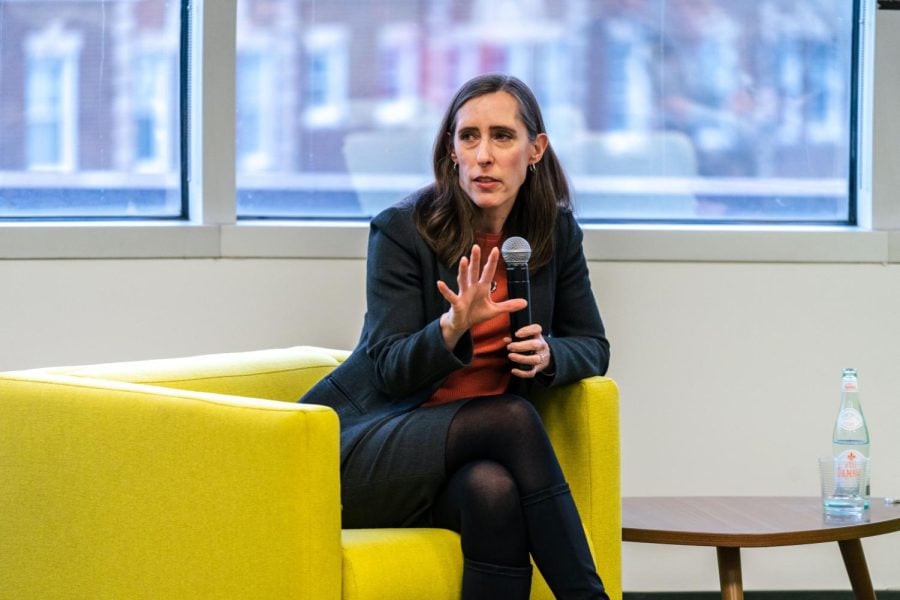Yale Law School Prof. Oona Hathaway speaks about legal implications of the Russia-Ukraine war
Jonah Elkowitz/Daily Senior Staffer
Yale Law Professor Oona Hathaway speaks about methods to convict Russian officials for crimes committed during the war in Ukraine at the Buffett Institute for Global Affairs on Tuesday, Feb. 21, 2023. Hathaway spoke as part of the “One Year into Russia’s Invasion: Will Justice Be Served? with Oona Hathaway” event.
February 22, 2023
Content Warning: This story contains mentions of murder, sexual violence, kidnapping and torture.
One year ago from this week, Russia launched a full-scale invasion of Ukraine, subjecting Ukrainian citizens to displacement, murder, sexual violence, kidnapping and torture.
With no end to the Russia-Ukraine war in sight, legal scholars and policymakers worldwide debated how Russian instigators might be prosecuted for crimes against humanity. At an event hosted by the Buffett Institute for Global Affairs on Tuesday, Oona Hathaway, professor of international law at Yale Law School, spoke about solutions within international legal frameworks.
Annelise Riles, executive director of the Buffett Institute, moderated the conversation with Hathaway for a virtual and in-person audience.
“Justice may take a very long time to be served,” Riles said at the event. “Yet, this also suggests a need and an opportunity to interrogate international law and to consider how our legal frameworks can be expanded or broadened to address these issues.”
During the event, Hathaway explained how the International Criminal Court has jurisdiction over war crimes, crimes against humanity and genocide in Ukraine. According to Hathaway, war crimes refer to actions intentionally targeting civilian infrastructure, whereas crimes against humanity are in reference to systemic pursuits to exterminate, export or deport a population.
While evidence suggests Russia is committing genocide in Ukraine, international and legal scholars debate whether to convict the country on that charge.
The ICC is currently conducting investigations and trials against Russian leaders and soldiers on war crimes and crimes against humanity, Hathaway said.
However, the ICC does not have jurisdiction to convict a country of a crime of aggression, or the action of waging war, according to Hathaway. She said the crime of aggression is considered a “supreme international crime” since subsequent crimes would not exist without it.
To avoid the ICC loophole, Hathaway said she is advising the United Nations General Assembly to create a special tribunal to convict Russian officials for crimes of aggression. The tribunal would focus on condemning leaders or those responsible for waging war.
“Who within the government has been responsible for the planning and initiation of this crime?” Hathaway asked. “There’s going to have to be evidence collected that would be sufficient to stand up in court to prove they are personally responsible for the crime of aggression.”
The special tribunal, however, would not have the authority to mandate Russia to turn over officials convicted of a crime of aggression to the UN. Instead, Hathaway said the UNGA anticipates neighboring countries — who would vote to approve and create the tribunal — would voluntarily turn convicted officials over.
Hathaway also spoke about critical next steps of the war and said Russian President Vladimir Putin hopes Western countries become tired of supporting Ukraine with weapons and other supplies. If Western support for Ukraine lessened, other states could feel emboldened to invade their neighbors as Russia did, which would be corrosive to the United Nations Charter Article 2(4), according to Hathaway.
“I’m cautiously optimistic because I think the global response has been powerful,” Hathaway said. “But I also think we can’t rest on our laurels because it’s not anywhere close to over yet.”
Yevgeniy Drobot, a consul for economics and public diplomacy at the Consulate General of Ukraine in Chicago, addressed the audience about the international community’s obligation to continue supporting Ukraine.
He said the world has become increasingly interdependent since the invasion, as Ukraine’s supply of wheat and grain to developing countries has significantly decreased, affecting 400 million global citizens.
“Thanks to events like these, we feel the support, and we know people in other communities care,” Drobot said.
Email: charlotteehrlich2025@u.northwestern.edu
Twitter: @charlottehrlich
Related Stories:
— Duda: 90 seconds to midnight. An arms race between nuclear powers is an imminent threat
— Sergey Ivanov teaches Classics at Northwestern after fleeing his home in Russia
— Northwestern professors teach class about Ukraine’s fight for independence



